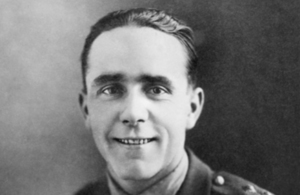WW1 Australian VC recipient Joseph Maxwell
The story of WW1 Australian First World War Victoria Cross recipient Joseph Maxwell.

Joseph Maxwell [Credit: Australian War Memorial P00171.002]
66 men from Australia received the Victoria Cross, Britain’s highest award for gallantry, during the First World War. As part of the Centenary Commemorations the people of the United Kingdom marked their gratitude to those courageous men by presenting a bronze memorial plaque to their home country engraved with their names. The plaque is now displayed at the Australian War Memorial. This archive tells their stories.
Name: Joseph Maxwell
DOB: 10 February 1896
Place of Birth: Sydney, Australia
Date of Action: 3 October 1918
Place of Action: Beaurevoir Line, Estrees, France
Rank: Lieutenant
Regiment: 18th Battalion, Australian Imperial Force
Joseph Maxwell was born on 10 February 1896 in Sydney, Australia and was an apprentice boilermaker before he enlisted in February 1915. He served with the 18th Battalion at Gallipoli and the Western Front and was commissioned in late 1917. He earned the Distinguished Conduct Medal, the Military Cross and Bar, and the Victoria Cross in just over 12 months.
Lieutenant Maxwell was awarded the Victoria Cross for most conspicuous bravery and leadership in attack on the Beaurevoir-Fonsomme line near Estates, North of St. Quentin, on the 3rd October, 1918. His citation explains further:
His company commander was severely wounded early in the advance, and Lt. Maxwell at once took charge. The enemy wire when reached under intense fire was found to be exceptionally strong and closely supported by machine guns, whereupon Lt. Maxwell pushed forward single-handed through the wire and captured the most dangerous gun, killing three and capturing four enemy. He thus enabled his company to penetrate the wire and reach the objective. Later, he again dashed forward and silenced, single-handed, a gun which was holding up a flank company. Subsequently, when with two men only he attempted to capture a strong party of the enemy, he handled a most involved situation very skilfully, and it was due to his resource that he and his comrades escaped. Throughout the day Lt. Maxwell set a high example of personal bravery, coupled with excellent judgment and quick decision.
After the war, Maxwell held a variety of jobs and wrote a book on his war experiences called “Hell’s Bells and Mademoiselles”. He died in 1967 and his Victoria Cross is held by the Australian War Memorial.